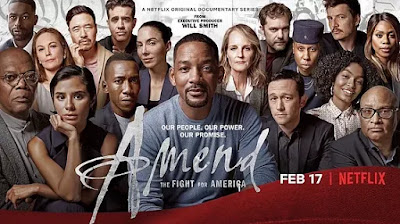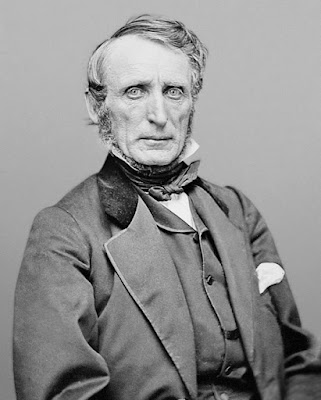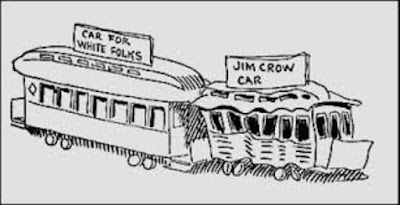This is the tale of the 14th Amendment, a Netflix show-and-tell by public figures — actors, scholars, journalists, activists. The 14th is about the workplace, the voting booth, and behind the bedroom door, making personal and intimate one’s being an American citizen. It takes us through slavery, segregation, a woman’s control of her person, rights of sex and love, and the uproar following each advance by ultra-traditionalists and racists.
A pair of eminent filmmakers have assembled this primer for us — part graphic teleplay (full of colorful animation sequences), part history lesson, part Ted Talk, that itemizes the rocky road to a more perfect union. The first drive toward parity incited the Civil War; the second the civil rights era of the 60’s, and now the third: a crazed reprieve of our racist Jim Crow past and what must be our drive to repel it. (Watch the trailer here.)
By the numbers white numbers are waning and blood is on the boil. Racism is out of the closet. That our minorities are about to outnumber white folk is whipping loathing and panic on the far right. AMEND: The Fight for America is both familiar and useful, laying out the facts as armor for the next battle.
The author-showrunners are Robe Imbriano and Tom Yellin, both writers, producers, directors in long careers of documentary-making (disclosure:Mr. Yellin is an acquaintance of mine). What this team has given us, together with its roster of distinguished presenters, offers a formidable, lively display of infotainment, akin to if more didactic than Hamilton, that belongs on everyone’s plate, even with explicit content. Will Smith, America’s Fresh Prince, is the affable narrator of Amend (and executive producer, along with Larry Wilmore, both below) and does not rule out going into politics himself.
So much of our litigation involves the 14th yet most of us barely know it exists, Smith tells us. The free speech and gun rights amendments are bandied about, but it’s the 14th that really affects our daily lives. “When I learned about it, I had to tell you,” says Smith; “this is why we are here —to tell our story, to tell its story.”
“If you are born in the US, you are a citizen. And under the law, everyone in America gets this thing called EQUAL PROTECTION. That means we all have the same rights...; no one can take those away without due process (your day in court).....”
We presume that ‘freedom’ is embedded in the Constitution, but it isn’t; it is implied. Only the IDEA of freedom is in the Constitution — freedom for white men. The majority of the first 16 presidents were slave-owners; their slave property did not figure. Hence it was the abolitionists among us who politicked for all to be named ‘citizen’ —to publicly insist on it because of the rights that attend to the appellation ‘citizen.’
Amend begins the lesson with Frederick Douglass, the slave who created a movement around ‘Why am I slave and you are not?’ Mahershala Ali speaks Douglass’s words (below), supported by other distinguished narrators of his road to citizen. His campaign led Lincoln to the Emancipation Proclamation; the amendment that ended slavery followed — the 13th.
Lincoln’s prompt assassination brought Andrew Johnson to the presidency, a racist, who instituted Jim Crow laws imposing virtual slavery on the freed black population. Enter John Bingham (below), a white Ohio Congressman and abolitionist, a man of prolific credentials and character:
“Those who set their feet upon the necks of defenseless fellow men...these man stealers, though their skins be as white as the driven snow, are the real niggers.” Bingham fathered the 14th in 1868 giving citizenship to every person born or naturalized in America. That is the second and perhaps real founding of the nation, moving us from ‘white male’ to melting pot.
As soon as it was passed, the 14th was attacked in the streets, in the courts, in the press and is followed by the 15th—the right to vote.
In retaliation, the old white male Supremes delivered ‘Plessey v Fergeson’ or ‘separate but equal’. The Court wrote that individuals are controlled by state not federal laws, ripping the guts out of the two new amendments and giving us a half-century of Jim Crow segregation. The South became a field of home-grown terrorists with lynching its arch-weopon.
Martin Luther King (Samuel L. Jackson, below) launched the Civil Rights movement: “Only the negro can understand the social leprosy that segregation inflicts...emotional battle in a never-ending war…”.
It has been a cage — segregated water fountains, bathrooms, pools, crumbling schools, fewer loans, homes and with scarce good jobs available, blacks have not been able to build intergenerational wealth. The 14th was a fraud; it was ignored.
Shouted Alabama Governor George Wallace: “The South was set upon by the vulturous carpetbagger and federal troops so that the infamous illegal 14th Amendment might be passed... I say segregation now, segregation tomorrow, segregation forever!”.....
In May 1963 Martin Luther King, helped by the new age of television, created a crisis that impelled President John Kennedy to act. The spectacle of nonviolent black youth prevented by police from entering (segregated) schools put Wallace on display. Kennedy sent troops and Wallace stood down. His collapse restored hope and sanity to the promise of the 14th.
Women used the playbook of the civil rights struggle to lobby for the 14th to apply to them. “We want what men have had all these years.”
“You can be somebody’s wife, somebody’s mother, somebody’s lover, somebody’s anything, but not SOMEBODY.” Women didn’t own their bodies, labor, or property until 1920 when they got the vote. The Equal Rights Amendment was written near 100 years ago in 1923, and Congress did not pass it until 1972. But wait, wait. The 38th state, VA, ratified it only last year in 2020. Arch-conservative Phyllis Schlafly (below c), the deadly debater, had mounted a backlash. To make good on the ERA, Congress must now extend the period of years in which ratification can take place.
The ‘love’ chapter will bring you to tears. Marriage and the 14th have a long history. By the time gay marriage hit the courts, intones Will Smith, “it’s not just about love. It’s about being seen and accepted by the government as full and equal citizens.”
Cases overturning bans on interratial marriage and sodomy preceded the case for gay marriage. But in 2015, Obergefell v Hodges finally arrived from Cincinnati, the most gay-mean city in America. Says Civil Rights lawyer Al Gerhardstein, “How can this be legal in America? When we founded our government a second time [the 14th]...we said that all persons are entitled to equal protection under the law.” Gerhardstein ushered the case to the Supreme Court. Justice Anthony Kennedy wrote the 2015 decision on the right to marry:
“The nature of injustice is that we may not always see it in our own times.The generations that wrote and ratified the Bill of Rights and the 14th Amendment did not presume to know the extent of freedoms in all of its dimensions and so they entrusted to future generations a charter protecting the right of all persons to enjoy liberty as we learn its meaning. No union is more profound than marriage for it embodies the highest ideals... In forming a marital union two people become something greater than once they were...they ask for equal dignity under the law...the Constitution grants them that right.” Said Jim Obergefell: that was the first time in my life as a gay man...that I felt like an equal American. (below l, Obergefell; r, Gerhardstein)
The last chapter of Amend addresses immigration and its attendant issues. Orphaned following the emotional prior chapter, its impact does not measure up, but the whole is not lessened and immigration is about to have its day. In short, we move through generations of to-ing and fro-ing — thrilled, frustrated, horrified as we re-experience exactly how fraught ‘citizen’ is. Today’s intransigence and flagrant racism of the Trumpists may mean a violent relitigation of the right to vote. Amend authors Imbriano and Yellin have struck while the iron is hot. Whether George Wallace copycats will connive to rule over the coming minority-majority is now the boulder we must shoulder up the hill. January 6 was their opening salvo.










































.jpg)








